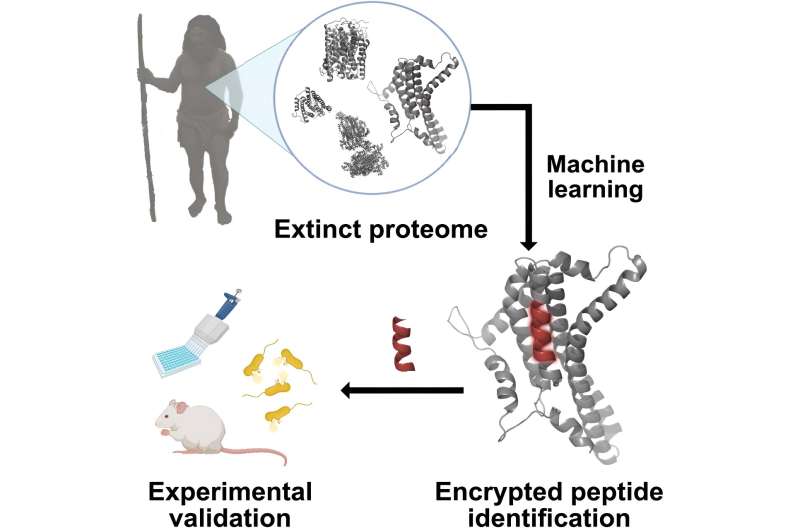
A team of microbiologists and bioengineers at the University of Pennsylvania has tested the possibility of bringing back extinct molecules to fight modern bacteria. In their study, reported in Cell Host & Microbe, Jacqueline Maasch, Marcelo Torres, Marcelo Melo and Cesar de la Fuente-Nunez used an AI application to bring back extinct molecules for testing against modern bacteria.
Medical scientists are in a race against time—increasingly, bacteria are developing resistance to modern therapies, leaving doctors with fewer options in treating patients with infections. In this new effort, the research team looked at the possibility of finding extinct molecules that might be able to kill bacteria alive today.
The idea behind this new research is that many organisms, including humans, produce peptides with antimicrobial properties. Those developed by humans are already used naturally by the body. But what about extinct human relatives such as Neanderthals and Denisovans? Perhaps they produced peptides that might be useful against modern bacteria.
Scientists do not have any samples of extinct human-relative tissue, but they do have maps for them in their DNA. To find the molecules that made up peptides produced by early human relatives, the team turned to artificial intelligence.
The team trained an AI app to spot sites on human proteins that are known to produce peptides. They used the app on data from modern humans, Neanderthals and Denisovans to find peptides from the latter two sources. They then compared the properties of the peptides they found with newer peptides to predict which of those in H. neanderthalensis and Denisovans might be bacteria killers.
Next, the team synthesized the molecules they identified and tested them against bacteria in a petri dish. Six of those that showed promise were then used to treat mice infected with Acinetobacter baumannii—a common bacteria found in hospital settings.
The team found that all six of the peptides slowed or stopped the growth of an infection but none actually killed the bacteria. They also found that five of the six did kill bacteria growing in skin abscesses, but that was only when doses were extremely high.
The researchers believe their approach shows promise. They suggest that more research using their approach might lead to more effective antibiotics.
More information:
Jacqueline R.M.A. Maasch et al, Molecular de-extinction of ancient antimicrobial peptides enabled by machine learning, Cell Host & Microbe (2023). DOI: 10.1016/j.chom.2023.07.001
© 2023 Science X Network
Citation:
Bringing back extinct molecules to fight modern bacteria (2023, July 31)
retrieved 31 July 2023
from https://phys.org/news/2023-07-extinct-molecules-modern-bacteria.html
This document is subject to copyright. Apart from any fair dealing for the purpose of private study or research, no
part may be reproduced without the written permission. The content is provided for information purposes only.










